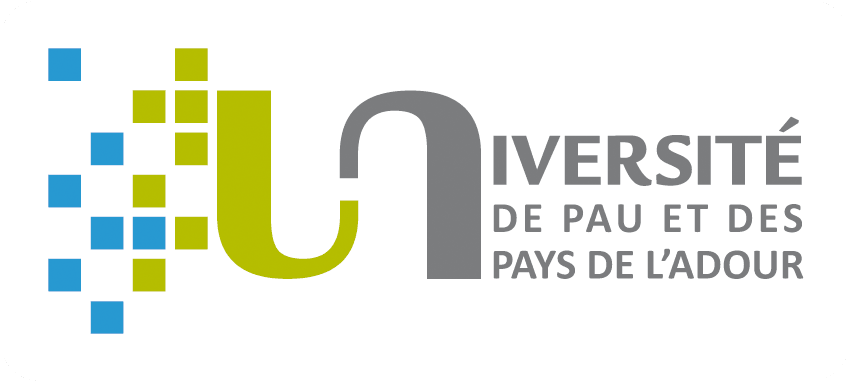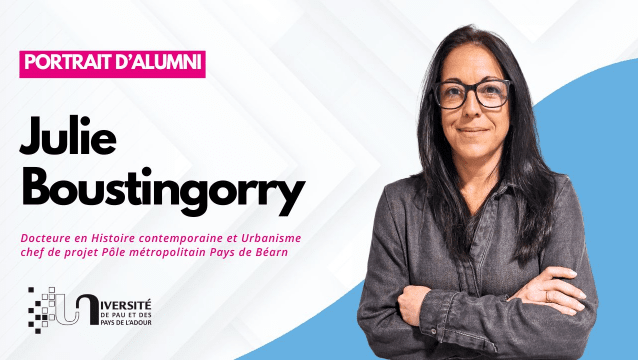Julie Boustingorry, Project Manager "Pôle métropolitain Pays de Béarn"
Doctor in contemporary history and urban planning, Julie Boustingorry, 44 years old, completed all her studies at UPPA. In 2010, after a thesis on Castor self-builders and a few years teaching at university, she joined the city of Pau as a heritage and architecture facilitator. In 2017, she was seconded to lead the Pays de Béarn initiative.
What are the major stages of your academic journey?
Originally from Bayonne, I chose UPPA to stay close to my family and study in a human-sized city. My initial plan was to pursue short studies. I wanted to prepare for the IUFM to become a primary school teacher. History and geography were subjects I really enjoyed in high school, and the degree offered by UPPA was one of the few that didn’t separate the two. In my third year, just before the IUFM entrance exam, I had the opportunity to do observation internships in middle and high schools. My desire to teach remained strong, but the university also opened up another unexpected path for me: research. It was a true discovery that tipped the balance and encouraged me to pursue a Master's in history-geography at UPPA. A professor pushed me toward it... And so did my family, who lived in a Castor self-built house in Bayonne. It naturally became my dissertation topic, on which there were almost no archives. I had to interview witnesses, which was quite new at the time for historical research, and develop my own method to analyze the material while remaining objective. UPPA gave me a lot of freedom with my topic and also offered amazing opportunities: I attended seminars at the Sorbonne, the Institut de Géoarchitecture in Brest, the École du Louvre, and the University of Montreal…
What do you take away from your years at UPPA?
UPPA helped me grow and opened a path – research – that I had never even considered. For the young student I was, it seemed totally out of reach. The professors and environment were decisive in my choices. Initially aiming for short, career-focused studies, I eventually found myself pursuing a doctorate... At university, you have to seize opportunities, and that's what I did throughout my studies. At the end of my Master's, I still didn’t know exactly which career to pursue. My thesis advisor told me about a new program, the DEA in Land Use Planning and Local Development... A small cohort the first year, with students from diverse backgrounds, bridging geography, history, and urban studies... That's when I wanted to continue with a PhD, to delve even deeper into the subject of Castor self-builders. Alongside, I took every training course offered by the doctoral school – management, positive communication, managing and coordinating complex projects… – and I mentored Master's students on action-research projects with local governments and elected officials. Even before it became trendy, I practiced mediation, an exciting "translation" step between researchers and policymakers. I also fulfilled my desire to teach by working as a Teaching and Research Assistant (A.T.E.R.) at UPPA during my PhD and for two years afterwards. It was a truly wonderful experience.
Did your PhD help with your professional integration?
Yes, absolutely. I was approached by the City of Pau while I was teaching in the Master's program in Heritage. I had worked with students on developing a cultural and heritage policy for the city. Our project impressed the mayor at the time, Martine Lignères-Cassou, who asked me to join the municipal team. We created a very hands-on postdoctoral project aimed at defining the city’s heritage strategy from both cultural and architectural perspectives. Following that, I passed the exam for Heritage and Architecture Facilitator, which allowed me to secure a permanent position. After years of fairly solitary research, I discovered the strength of collective work and really enjoyed working in a team. The projects kept coming: the "City of Art and History" candidacy and, in 2017, my secondment to coordinate the Pays de Béarn initiative.
Two or three words you spontaneously associate with UPPA?
Freedom – Success – Humanity
Any advice for UPPA students starting their studies?
I would tell young students that a diploma is only as valuable as what you make of it. Choose subjects you love and don’t listen to those who say that history and geography only lead to the CAPES exam. That’s completely false! On the contrary, these are fundamental disciplines that teach you to think critically and develop analytical skills. They open many doors.
Interview conducted by Florence Elman
Want to know more?
Bachelor’s Degree in History-Geography
Master’s Degree in History-Geography (CAPES track) Master TREE

Comments0
Please log in to see or add a comment
Suggested Articles


